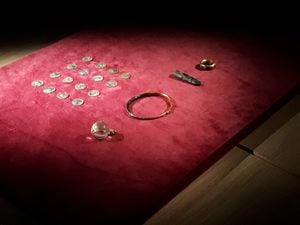Jailed men who stole Viking treasure hoard given warning if they don't repay £600,000 each
Two men who stole a Viking treasure hoard worth in excess of £3.2m have been ordered to repay over £600,000 each.

George Powell, 41, and Layton Davies, 54, now have three months to pay back the money in full or they will have five years and four months added onto their current prison sentences.
The metal detectorists were jailed in November 2019 for stealing the "emblematic" Leominster Hoard of coins and priceless jewellery worth up to £12 million – much of which is still missing.
The items, many of which were Anglo Saxon but are typical of a Viking burial hoard, were dug up on Herefordshire farmland on June 2, 2015.
Scheming Powell and Davies were sentenced to 10 years and eight years six months respectively after being found guilty of theft, conspiracy to conceal criminal property, and conspiracy to convert criminal property. However, the sentence was later reduced to six years and five years following a successful appeal.
The Confiscation Order, under the Proceeds or Crime Act 2002, was made on Wednesday at Worcester Crown Court, after His Honour Judge Cartwright rejected the evidence presented by both men at the contested hearing, giving a number of reasons.
These mainly centred around conflicting evidence presented in both the 2019 criminal trial and the Confiscation Contested Hearing.
He also rejected Davies’s claims that he played a reduced role in the criminal enterprise claiming he didn’t stand to benefit equally with Powell.
The Judge disagreed and made a hidden assets order whereby he determined that they both still possess the coins and that the value of these coins is £600,000 each.
Superintendent Edd Williams, local policing commander for Herefordshire, said: “I’m delighted with today’s result, which brings closure to an investigation which we have been working on for seven years.
“The Confiscation Order, coupled with the sentences Powell and Davies received, send a strong and clear message that we take this sort of crime very seriously and will take action. It is a criminal offence to not declare finds of treasure to the local coroner’s office.
“I’d also like to take this opportunity to thank our partners, including Herefordshire County Council’s conservation and environment team and The British Museum, for their support in bringing this case to a successful conclusion.”
The convictions followed a lengthy investigation by West Mercia Police following several reports from the metal detecting community and the British Museum of an unreported large treasure find near Eye in Herefordshire in 2015.
It was discovered that the men had visited the site of the hoard, which included Anglo-Saxon coins, jewellery and silver ingots, during spring 2015.
They not only failed to disclose the extent of their discovery - a requirement under the Treasure Act 1996 - but also sold a large number of the items for significant personal financial gain.
The treasure, dating back 1,100 years, was described by experts as being of national importance both for Anglo-Saxon coinage and for the wider understanding of a key period in English history.
It is thought the trove was buried by someone within the Great Viking Army in either 878 or 879, which by then was being forced back east by an alliance of Saxon forces.
Dr Gareth Williams of the British Museum said: “It is not just the theft of the objects that is important in this case. It is the fact that the knowledge has effectively been stolen from everyone."





